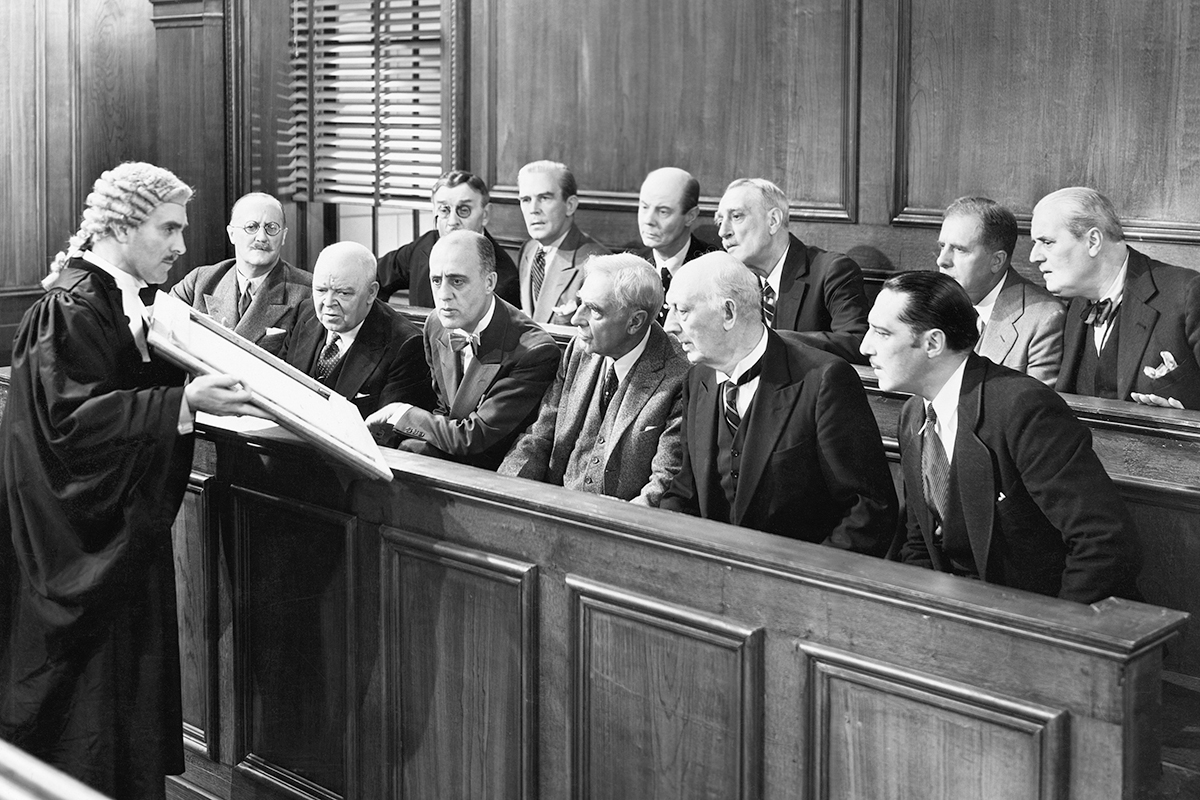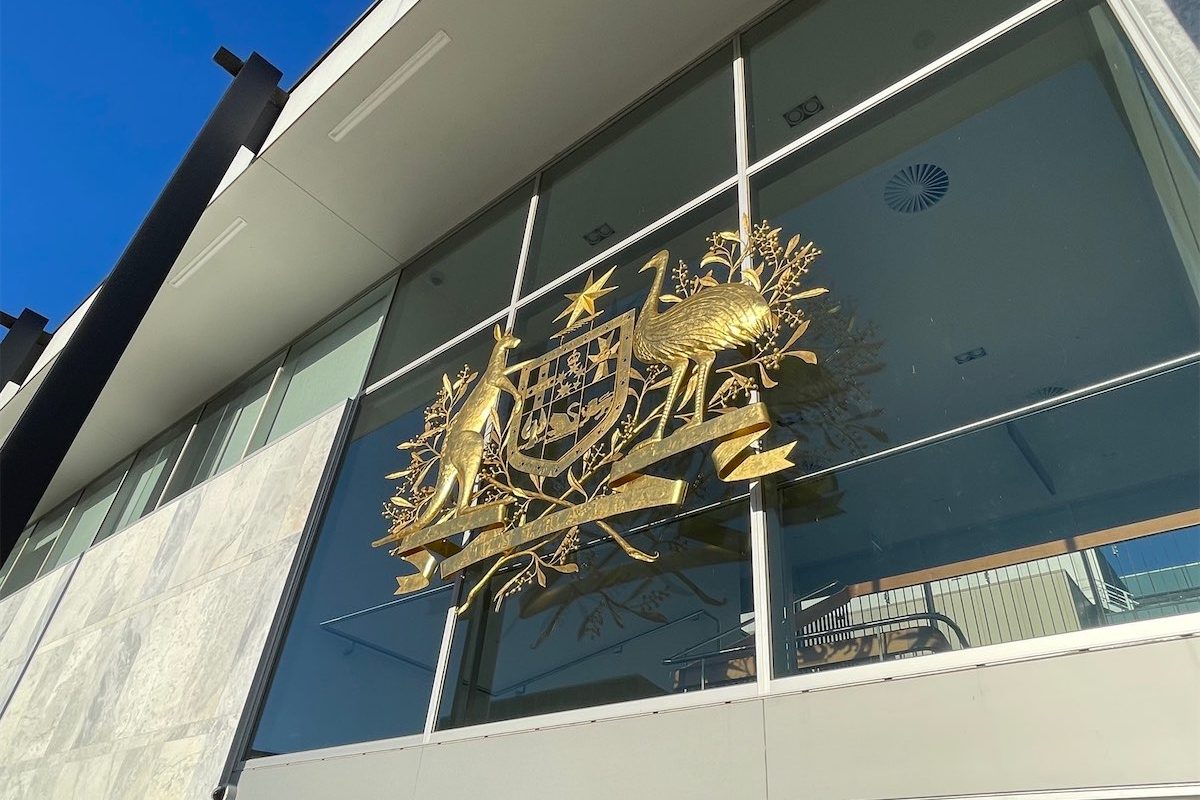
The trial of Bruce Lehrmann, accused of raping Brittany Higgins in Parliament House in 2019, was sensationally ended in October when the entire jury was discharged after a juror was found to have brought a research paper on sexual assaults into the jury room. So, what’s it actually like to be a juror? Legal columnist HUGH SELBY explains…
AFTER you receive a notice to be a juror then you, along with a crowd of others, will turn up wondering what happens.

At court you’ll watch a useful video explanation of typical jury duty. Being a bit stressed you won’t recall much of it.
After the video and a cuppa, your group (known as a panel) will be guided into the public gallery of the trial court for the jury selection.
Each person will be assigned a number. The names of witnesses will be read out so that any prospective juror with knowledge of a witness is sent to another trial.
Those seeking to be excused from being jurors will explain their reasons in a private conversation with the trial judge who will then say “go” or “stay”.
One of the court staff will pick a number from a small box and call it out. The person with that number then walks from the public gallery to the jury seats.
Either the prosecutor or defence may make a pointless “challenge”, in which case that person will go to another trial. The challenges are pointless because there is nothing to back them up: they are just theatre.
The number calling continues until alongside you there will be at least 11 fellow jurors. There may be several more, possible replacements if one or more of those chosen in the first 12 are not able to take part in the jury decision-making, because they are ill or have been taken off the jury for some reason.
You will have noticed that the advocates are wearing black gowns and wigs (unless both agree not to). Why we maintain this nonsense defies rational thinking; however, sufficient advocates think horsehair on their head (rather than in old pillows) is so attractive that occasional votes to get rid of it fail.
Those chosen jurors now listen to the judge’s welcome.
This will outline the trial journey, what happens if you get sick/can’t come and that you must limit the information you consider as a juror to the evidence that you see and hear in the trial (that judge’s instruction doesn’t work – in the ACT we know from a 2022 trial that 17 repetitions are insufficient).
You are instructed to choose your chairperson during a break, that you can send the judge notes with questions or requests via that chairperson, and that you can make notes of the evidence with a pad/pencil or tablet – but they stay in the courthouse.
There’s a double standard built into our jury trials: you are told that you are important, that you are the judges of the facts, but you are then treated as the audience to a play in which you are not an active player: be seen, but not heard is the unstated instruction from the time you enter the public gallery until you go to the jury room to decide the accused’s fate. Then and only then do you matter.
The prosecutor opens with an outline of how they will present their case, setting out what each witness will tell you about. It is NOT an argument to persuade you.
They may tell you about the law – this can be really useful, but they have to tell you that the judge will explain the law later (usually at the end of the trial) and the judge’s explanation is what matters.
This is confusing because now you have no idea whether you should have paid any attention to the prosecutor’s explanation of the law.
The defence advocate may make an opening, if they think it’s worthwhile. Why? It’s up to the prosecution to prove its case and the defence may choose not to share its defence plan with them or with you, the jurors.
It’s quite possible that the defence strategy is no more than picking holes in the prosecution case. Why? Because the defence aim is to create a reasonable doubt in your mind, no more and no less.
Wouldn’t you like to be told about the applicable law from an authoritative source before you hear the evidence? Not having that law is rather like going to a sports event but having no idea about the rules of the game.
If the judge hasn’t explained the law, then send a note asking them to do so before the first witness is called. There may be one or more counts (or charges) that you must consider, possibly with different legal tests.
And if they won’t explain the law? Fine, it can become an appeal point and we can improve jury trials either by appellate judges being proactive, or our pollies amending the law to make the experience of future jurors better.
At any time during the trial there can be legal issues that the judge needs to resolve. Examples include whether some evidence will be allowed or not, whether something has happened that requires a juror or all the jury to be discharged, or how to answer a note from the jury.
You’ll be sent out to your jury room while that discussion happens: use the time to chat about what’s happening and get to know each other.
The prosecution calls its witnesses. They have control over the order. Each one is questioned by the prosecution (that’s evidence in chief) then cross-examined by the defence (if there is more than one accused then more than one lawyer may cross-examine) and then the prosecution gets a second go with their witness (called re-examination).
It’s the same with the defence – that’s if they choose to call any evidence.
Remember, the prosecution has to prove its case. The defence does not need to disprove.
You are assessing the believability of each witness along with the value of his or her evidence. You will be watching as well as listening.
“Good character” evidence is often a part of the defence – especially for those with no prior criminal history. Because it may be your only insight into the accused’s past life, be sure to pay close attention to those witnesses as they talk about the accused’s past character.
Once a witness is excused then their part in the trial is finished. Sometimes, however, a witness is “stood down”. This means that they can be called back.
If you feel that something is missing in the evidence then send a note before the witness is excused: “Can this witness tell us anything about X?”
You will be sent out to the jury room while the judge and the opposing lawyers discuss the answer to your question/s.
The lawyers sum up their case with a closing argument, which will mix facts and legal principles. Too many of these go on for too long. Don’t pretend you can pay attention for more than an hour. Ask for a break, especially mid-afternoon. You can also ask them, by a note through your chairperson, for their argument about such and such. You don’t have to accept what they tell you.
Then the judge gives you directions, a lot of them. They have to – it’s the law. The directions on various legal principles are rather formulaic, so if you don’t understand a point/s then ask the judge to repeat it.
Then, at long last, you become important. Twelve jurors are sent to the jury room to reach a decision about guilty or not guilty on each charge, be that one or many.
Respectful discussion is the key to reaching a decision that feels just right. Let everyone briefly state what they see as the key points. Don’t start with an open poll (like a show of hands) because that introduces division too early. Ensure that everyone is heard, but put a collective stop to those who seek to dominate or waffle.
You can ask the judge for parts of the evidence to be replayed (because it’s all recorded). When you take a poll make it anonymous.
While patience is a virtue, it has limits. What if there is an obdurate dissenter to everyone else’s decision? You cannot change a fixed belief. Put an end to the discussion as soon as the judge lets you – and get discharged.
ACT law requires a 12 to 0 decision. Other places have changed the law to allow 11 to 1, even 10 to 2. Here, a unanimous result is required. Do your best.
When it’s all over, and you are parting from your fellow jurors, take a moment or two to enjoy the knowledge that you have given back to your community.
Hugh Selby is the “CityNews” legal affairs commentator. His free podcasts on “Witness Essentials” and “Advocacy in court: preparation and performance” can be heard on the best known podcast sites.
Who can be trusted?
In a world of spin and confusion, there’s never been a more important time to support independent journalism in Canberra.
If you trust our work online and want to enforce the power of independent voices, I invite you to make a small contribution.
Every dollar of support is invested back into our journalism to help keep citynews.com.au strong and free.
Thank you,
Ian Meikle, editor









Leave a Reply